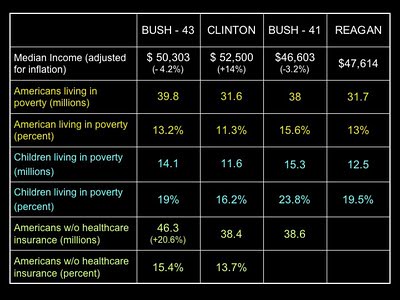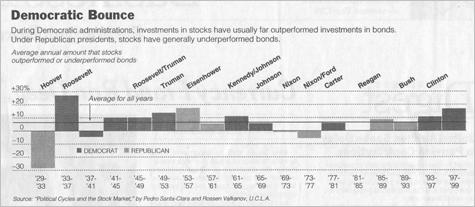Sorry, Newt: Democrats are the Party of Paychecks
In his latest effort to rebrand both the Republican and Democratic parties, former House Speaker Newt Gingrich has also rewritten history. Labeling his GOP "the party of paychecks" and Democrats "the party of food stamps" in advance of his upcoming campaign swing, Gingrich declared "we have historically since Ronald Reagan of 1980 been the party of job creation." Sadly for Newt's mythmaking, the historical record clearly states otherwise. From job creation and expanding incomes to GDP growth, stock market performance and almost any other measure of success, the economy almost always does better under Democrats.
Three deceptions are central to Gingrich's latest Republican marketing fraud. First, while food stamp use has increased under President Obama, poverty began its steep rise even before the start of the Bush Recession in December 2007. More pathetic, however, is Gingrich's claim that Republicans deserve credit for the booming Clinton economy and budget surpluses of the 1990's. Despite the fact that every single Republican in both houses of Congress voted against the Clinton stimulus and deficit reduction package of 1993 (and about which Newt wrongly warned "I believe that that will in fact kill the current recovery and put us back in a recession"), Gingrich gave his party kudos for the boom which ensued:
Compare this to our record after we took control of Congress in 1994.
In four years, unemployment fell from 5.6% to 4.2% and food stamp usage dropped by 8 million American thanks to record job creation. Furthermore, we turned a $107 billion deficit into a $125 billion surplus in four years, paying off more than $400 billion in federal debt. And we did it with a liberal Democrat in the White House.
And when the top tax rate was, as President Obama and Democrats now propose, 39.6%.
But while Newt Gingrich is quick to appropriate credit for Democratic economic successes, his thid tactic is to refuse to blame Republicans for their own failures.
To be sure, George W. Bush and his Republican allies in Congress provided the perfect bookend to era of modern Republican economic management ushered by Herbert Hoover. The verdict on President Bush's reign of ruin was pronounced even before Barack Obama took the oath of office. January 9, 2009, the Republican-friendly Wall Street Journal summed it up with an article titled simply, "Bush on Jobs: the Worst Track Record on Record." (The Journal's interactive table quantifies his comparative failure.) Just days after the Washington Post documented that George W. Bush presided over the worst eight-year economic performance in the modern American presidency, the New York Times on January 24 featured an analysis ("Economic Setbacks That Define the Bush Years") comparing presidential performance going back to Eisenhower. As the Times showed, George W. Bush, the first MBA president, was a historic failure when it came to expanding GDP, producing jobs and fueling stock market growth.
But it was the release of a Census Bureau report in September ("Income, Poverty, and Health Insurance Coverage in the United States: 2008") which in 67 pages laid bare the economic devastation and human toll during the Bush presidency. As The Atlantic ("Closing The Book On The Bush Legacy") rightly noted, "It's not a record many Republicans are likely to point to with pride":
On every major measurement, the Census Bureau report shows that the country lost ground during Bush's two terms. While Bush was in office, the median household income declined, poverty increased, childhood poverty increased even more, and the number of Americans without health insurance spiked. By contrast, the country's condition improved on each of those measures during Bill Clinton's two terms, often substantially.
This table (via The Reaction) provides a horrifying snapshot of the scope of the national calamity under George W. Bush:
The extent of Dubya's failure was particularly glaring when it came to employment and job creation. The dismal 3 million jobs created under President Bush didn't merely pale in comparison to the 23 million produced during Bill Clinton's tenure. As the reliably Republican Wall Street Journal summed up its interactive table on the subject, "Bush on Jobs: The Worst Track Record on Record." In September 2009, the Congressional Joint Economic Committee charted Bush's job creation disaster, the worst since Hoover:
Sadly for the Republican message machine, the GOP's pitiful record on the economy isn't limited to Bush 43. History shows that from GDP growth and job creation to managing the national debt and producing gains for investors, it is the Democratic Party which is the friend of Wall Street and Main Street alike.
As the New York Times detailed in January, across almost every indicator (article here, charts here), Democrats outperformed their Republican counterparts:
For the investor class so fond of perpetuating the myth of Republicans' superior economic stewardship, the collapse of the stock marketing during the Bush recession must be particularly galling. The Standard & Poor's 500 spiraled down at annual rate of 5.6% during Bush's time in the Oval Office, a disaster even worse than Richard Nixon's abysmal 4.0% yearly decline. (Only Herbert Hoover's cataclysmic 31% plunge makes Bush look good in comparison.)
As it turns out, as the New York Times also showed in October 2008, the Democratic Party "has been better for American pocketbooks and capitalism as a whole." To make its case, the New York Times asked readers to imagine having put their money where its mouth is. Contrary to Republican mythology, Americans fare better - much, much better - under Democratic administrations:
As of Friday, a $10,000 investment in the S.& P. stock market index would have grown to $11,733 if invested under Republican presidents only, although that would be $51,211 if we exclude Herbert Hoover's presidency during the Great Depression. Invested under Democratic presidents only, $10,000 would have grown to $300,671 at a compound rate of 8.9 percent over nearly 40 years.
(For the eye-popping chart of the S&P's performance under each of the presidents from Hoover through Bush 43, visit here.)
As the broader record shows, the best path to prosperity is to elect Democratic presidents.
The superior performance of Democratic presidents covers virtually the entire spectrum of economic indicators. As Elliott Parker of the University of Nevada, Reno detailed in a 2006 paper, since 1949 Democratic administrations have done better than Republican ones when it comes to unemployment (5.2% to 6.0%), job creation (-.0.4% decrease in unemployment, compared to 0.3% increase), GDP growth rate (4.2% to 2.9%), and even corporate profits as a share of GDP. And to be sure, he found the Dow benefits from Democrats in the White House.
There's no shortage of studies to show that stock market returns are higher under Democratic leadership. (As it turns out, Wall Street's performance is also better when Democrats control Congress.) In 2000, Pedro Santa-Clara and Rossen Valkanov of UCLA's Anderson School of Business concluded that "that the average excess return in the stock market is higher under Democratic than Republican presidents - a difference of 9 percent per year for the value-weighted portfolio and 16 percent for the equal-weighted portfolio." As the New York Times noted of UCLA study in 2003:
"It's not even close. The stock market does far better under Democrats...
...Professors Santa-Clara and Valkanov look at the excess market return - the difference between a broad index of stock prices (basically the Standard & Poor's 500-stock index) and the three-month Treasury bill rate - between 1927 and 1998. The excess return measures how attractive stock investments are compared with completely safe investments like short-term T-bills.
Using this measure, they find that during those 72 years the stock market returned about 11 percent more a year under Democratic presidents and 2 percent more under Republicans - a striking difference."
In 2002, Slate similarly concluded that "Democrats, it turns out, are much better for the stock market than Republicans":
Slate ran the numbers and found that since 1900, Democratic presidents have produced a 12.3 percent annual total return on the S&P 500, but Republicans only an 8 percent return. In 2000, the Stock Trader's Almanac, which slices and dices Wall Street performance figures like baseball stats, came up with nearly the same numbers (13.4 percent versus 8.1 percent) by measuring Dow price appreciation. (Most of the 20th century's bear markets, incidentally, have been Republican bear markets: the Crash of '29, the early '70s oil shock, the '87 correction, and the current stall occurred under GOP presidents.)
According to almanac editor Jeffrey Hirsch, the presidential party figures are among the most significant he's found. If the stock market were random, we'd expect such a result only one-quarter of the time. "I don't know why people are convinced Republicans are good for the stock market," Hirsch says.
Why? Because Republicans and their water carriers continue - with great success - to perpetuate the myth that the regulation-free policies of the GOP that so benefit them personally somehow help the American people overall. Given that the national debt tripled under Ronald Reagan and doubled again under George W. Bush, it's no wonder Dick Cheney famously declared:
"Reagan proved deficits don't matter."
Not, apparently, until a Democrat is in the White House.
And so it goes. For his part, Newt Gingrich is simply recycling his old 1993 talking points in telling his GOP colleagues, "You should use this vivid contrast between the tax raising, job killing agenda of the Democrats and the low tax, job creating agenda of the Republicans as a way to reinforce the choice for voters this fall." Sadly for Newt, neither history nor the truth is on his side. As the DNC's Hari Sevugan pointed out, while Democrats have been adding jobs,"Under Republican economic policies, nearly 800,000 Americans lost their job every month." Instead of listening Newt, voters would do well to remember the words of Harry Truman, as true today as when he uttered them generations ago:
"If you want to live like a Republican, vote Democratic."






